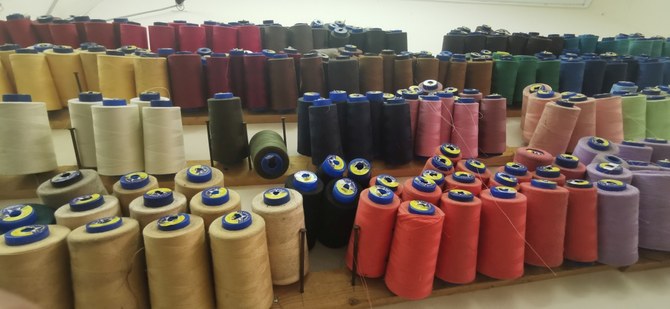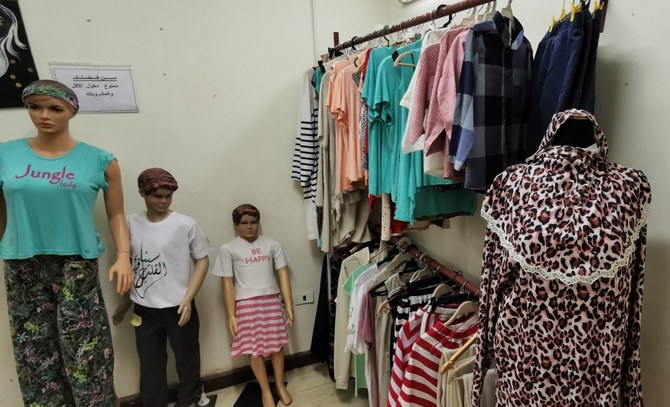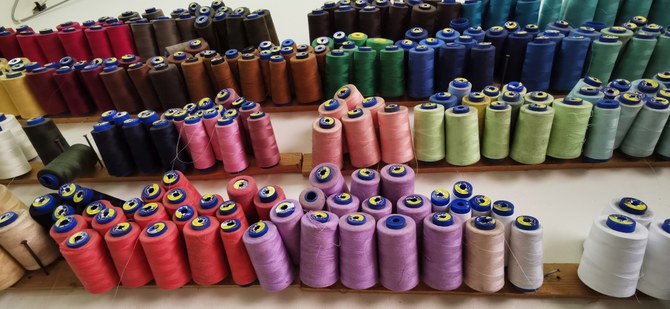CAIRO: “It was all going well until I defaulted on many due instalments, and soon after, I found myself in prison,” says Nahla (not her real name) while sewing a garment at a workshop owned and operated by New Life.
The business incubator, which aims to economically support underprivileged women, is a collaboration between the Egyptian non-profit Prisoners of Poverty and the Zurich-based Drosos Foundation.
Nahla, 32, had no clue at the time that defaulting on an instalment could land her in prison. Like many women who end up in her situation, she was going to spend a significant portion of her twenties locked away.
However, one day in the early 1990s, years before Nahla was imprisoned, an Egyptian journalist was reporting on a story from Qanater Female Prison when she noticed a group of children playing in the prison yard.
Driven by journalistic curiosity, Nawal Moustafa, now president of Prisoners of Poverty, started investigating how babies and toddlers could possibly end up incarcerated.
After interviewing many of the mothers, Moustafa started noticing a clear pattern in their stories — defaulting on debt instalments. The prevailing trend was that the majority of these women had incurred debt to support their families after their husbands, the breadwinners, had abruptly abandoned them.
After publishing a series of in-depth interviews with some of these inmates, Moustafa received an outpouring of support from her readers, prompting her to look into an effective way to help.
“It was an odd thing at the time for someone to sympathize with imprisoned people,” Moustafa said.
“Even my friends found it odd, and some of them accused me of championing criminals. But what I was certain of was that not all of them were criminals, and a lot of my readers agreed.”
Helped by donations from her readers, she initially provided daily essentials to these women and their children, the latter entitled by law to stay with their mothers on a monthly basis until they turn two.

Over time, Prisoners of Poverty has become a destination for underprivileged Egyptian women looking to make a living. (Supplied)
Aided by the prison’s officers, Moustafa started identifying cases of women taken advantage of by their husbands or incarcerated due to their genuine lack of resources.
“All the ‘ailments of poverty’ were evident in these women’s stories,” said Moustafa. “I felt responsible toward them. You can visit a hospital or a shelter to volunteer, but you’d never think about going to a prison. I felt that God had sent me to be their voice.”
By the early 2000s, Moustafa was working tirelessly to collect funds to pay these women’s debts so they could be free. However, she quickly discovered that many of them ended up back in prison for more or less the same reasons.
“After they are released, they become not only vulnerable due to their lack of resources, but even more unable to land jobs because of the stigma associated with being an ex-convict. Some of them are even disowned by their families because of the stigma, so they end up incurring debt again,” she said.
Seeking a more drastic solution, Moustafa launched Prisoners of Poverty in 2007. Not only did she pay the debt of women deemed deserving of a second chance, but she also established a workshop where they could learn skills — like knitting, sewing, or catering — to be able to make a living and break the vicious cycle.
Over time, Prisoners of Poverty became a destination for underprivileged women looking to make a living. Some were ex-prisoners; others were at high risk of ending up in prison.
In 2014, the Drosos Foundation joined in with more funding, enabling the launch of New Life — a sewing workshop for garments, textiles and thread paintings, among many other products.
Some of the women have gone on to launch their own businesses, and many others still rely on the workshop, making enough to support themselves and their families.
Due to her efforts in this area over the past two decades, Moustafa has won a number of awards and accolades across the region. Most notable among them is the 2018 Arab Hope Maker, a prize of AED 1 million ($272,300), awarded by Sheikh Mohammed bin Rashid Al-Maktoum, ruler of Dubai and vice president of the UAE.
-------------------
This report is being published by Arab News as a partner of the Middle East Exchange, which was launched by the Mohammed bin Rashid Al Maktoum Global Initiatives to reflect the vision of the UAE prime minister and ruler of Dubai to explore the possibility of changing the status of the Arab region.




























